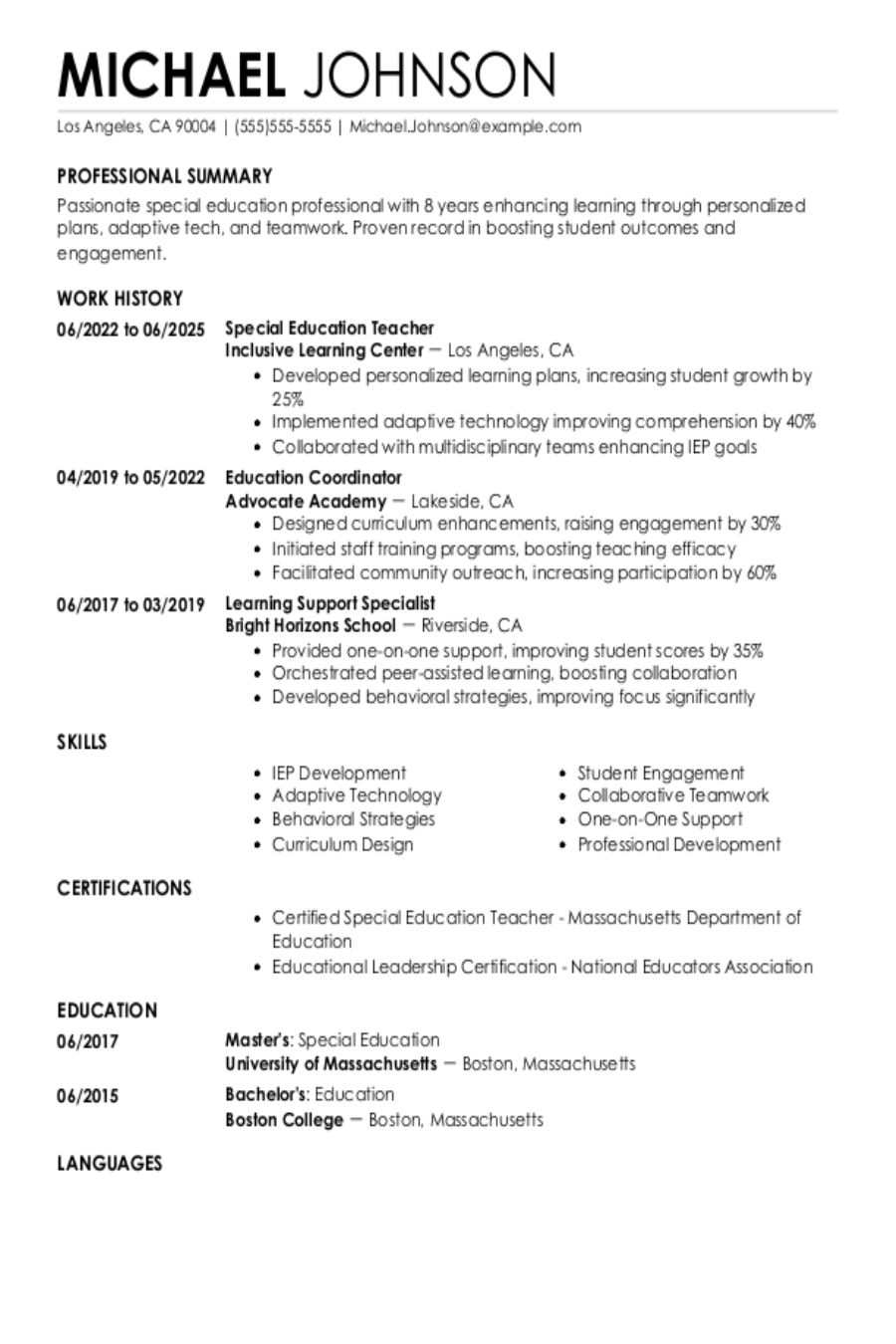Understanding your work values can help you make informed career decisions and find roles that align with what matters most to you.
By identifying and prioritizing your work values, you can shape a career path that not only meets your professional goals but also supports your overall well-being and success.
This guide will explain:
- What work values are
- Why understanding work values is important
- Examples of work values for different jobs
- How you can identify your work values
Make your resume complement your work values. With our AI Resume Builder, you can quickly and easily assemble your resume to fit your needs. Simply upload your old resume or start a new one, select your favorite template, and tell us your job title. Then, we'll generate content suggestions you can add to your resume with one click!
What Are Work Values?
Work values, also known as career values, are the fundamental beliefs that influence your behavior and decisions in the workplace.
These values dictate how you prioritize various aspects of your job, such as work-life balance, personal growth, or collaboration with others. Your work values reflect what is most important to you professionally, guiding you toward opportunities that align with your needs and preferences.
Examples of common work values
- Work-life balance: Prioritizing time for personal interests, family, and rest while maintaining productivity at work. A job that allows flexibility and respects your time outside of work can help support this value.
- Professional development: The desire to continually learn and grow in your career. If this is a core value for you, seeking out opportunities for training, mentorship, and career advancement will be a priority.
- Stability and security: A preference for job roles that offer long-term stability, financial security, and a predictable work environment. This is important if you value dependability in your career.
- Autonomy and independence: Enjoying the freedom to make decisions, set your own goals, and work with minimal supervision. If you value independence, you may prefer jobs where you have the authority to manage your own work.
- Creativity and innovation: A drive to be imaginative and bring fresh ideas to the table. This value is essential in roles that require problem-solving and new approaches, such as marketing, design, or entrepreneurship.
- Collaboration and teamwork: Preferring to work closely with others to achieve common goals. If teamwork is one of your values, you'll likely excel in positions that require group coordination and communication.
How work values can shape a career path
Your work values help shape your career by influencing the types of roles and work environments that best suit you.
For instance, if you value creativity and innovation, you may gravitate toward fields like design, advertising, or entrepreneurship, where you can think outside the box.
On the other hand, if stability and security are your top priorities, careers in government or large corporations may be more aligned with your values.
Why Understanding Your Work Values Is Important
Understanding your work values is crucial for creating a fulfilling and successful career. When your career aligns with your personal values, it fosters motivation, job satisfaction, and a sense of purpose.
This alignment helps you feel more connected to your work, making you more likely to excel in your role and maintain long-term happiness in your professional life.
The impact of aligning work values with your career
When your job aligns with your work values, you are more likely to feel motivated and engaged.
For example, if you value professional development and find a job that offers ample learning opportunities, you'll feel a greater sense of purpose. This alignment can also lead to higher levels of productivity, reduced stress, and a stronger commitment to your work.
When you work in a role that resonates with your values, it becomes more than just a job—it's an extension of your personal beliefs and aspirations. This leads to a deeper sense of fulfillment, which in turn increases your employability, job satisfaction, and overall career success.
Consequences of ignoring your work values
If your job doesn't align with your work values, it can lead to dissatisfaction and frustration. Over time, this disconnect can erode your motivation and performance.
For example, if you highly value work-life balance but work in a job that demands long hours and offers little flexibility, you might experience burnout or a decline in mental well-being.
Ignoring your work values can also result in frequent job changes as you search for a better fit. This can lead to feelings of instability and uncertainty in your career. Understanding your values helps you avoid these pitfalls and creates a foundation for long-term career satisfaction.
Understand your values for better career decisions
By clearly understanding your work values, you can make better career choices that align with your long-term goals. Whether you're choosing a new job, considering a career change, or evaluating potential employers, knowing your values allows you to assess opportunities based on what truly matters to you.
This self-awareness can also improve your decision-making skills during the hiring process. You'll be able to identify red flags during interviews and ask the right questions to determine if a company's culture aligns with your personal values, ensuring a better fit from the start.
How to Identify Your Work Values
Identifying your work values begins with self-reflection. By examining your past experiences, current priorities, and future goals, you can uncover the core principles that guide your career decisions.
Here are some steps to help you identify your personal work values:
1. Self-reflection exercises
Start by taking time to reflect on your past and present jobs. Think about the roles you've held, the environments you've worked in, and what you've enjoyed—or disliked—about each.
Consider the following:
- Identify your peak experiences: Reflect on moments when you felt the most energized and fulfilled at work. What tasks or projects were you working on? What was the environment like?
- Examine your frustrations: Think about times when you felt unmotivated, dissatisfied, or frustrated at work. What factors contributed to those feelings? Was it the work itself, the lack of recognition, or perhaps the company culture?
- Visualize your ideal workday: Take some time to imagine a typical day in your ideal job. What are you doing? How do you feel? Consider the type of tasks you're working on, your interactions with others, and the overall atmosphere. This exercise can help clarify the work values that are most important to you by focusing on what truly brings you satisfaction and motivation.
2. Examples of questions to ask yourself
To further explore your work values, ask yourself questions like:
- What motivates you at work? Do you thrive on achieving personal growth or hitting measurable targets? Do you feel energized by collaboration or independence?
- What do you prioritize in your professional life? Do you value learning new or unique skills, helping others, or working in a structured environment?
- What work environments make you thrive? Do you prefer a fast-paced, dynamic environment or one that's more predictable and stable? Do you feel more productive in a highly collaborative atmosphere or when you have the autonomy to work independently?
- What type of work environment energizes you? Do you prefer a structured, formal setting or do you thrive in a more relaxed, creative atmosphere?
- How do you define success in your career? Is success for you about climbing the corporate ladder, making a positive impact, or achieving a healthy work-life balance?
3. Personality and career assessments
Personality and career values assessments can also be useful tools for identifying your work values.
These tests provide insight into your preferences, strengths, and tendencies, helping you better understand the types of environments and roles that align with your values.
- Myers-Briggs Type Indicator (MBTI): This widely used personality assessment helps identify your work style and preferences based on four major personality traits. It can provide valuable insight into your work values and the types of jobs that might suit you.
- StrengthsFinder: This assessment focuses on identifying your natural talents and strengths. By understanding where you excel, you can better align your work with activities that feel rewarding and fulfilling.
How to Find Jobs That Align With Your Work Values
Finding a job that aligns with your work values is key to long-term job satisfaction and career success.
By focusing on researching potential employers, carefully analyzing job descriptions, and asking the right questions during interviews, you can ensure that the job and company culture match your values.
Before applying to a job, it's important to research the company's culture and values to see if they align with your own.
Here are a few strategies to help you dig deeper:
- Check the company's website and mission statement: Many companies highlight their core values, mission, and vision on their website. Look for statements that resonate with your work values, such as an emphasis on innovation, collaboration, or work-life balance.
- Review their social media presence: A company's social media can provide insights into its culture. Pay attention to how it engages with its audience, highlights employee achievements, and promotes its workplace environment.
- Explore employee testimonials: Look for videos, blogs, or articles written by employees. Companies often showcase their team's perspectives on what it's like to work there, giving you a window into the culture.
Questions to ask during interviews to gauge a company's values
During the interview process, you have an opportunity to evaluate whether the company's culture and work environment align with your values. Be prepared to evaluate the questions the interviewer asks, as they can provide insight into the organization's culture.
Prepare for the interview with some questions you can ask the interviewer that will help you assess their compatibility with your work values, such as:
- How would you describe the company's culture? This open-ended question allows the interviewer to give you a sense of the overall atmosphere and values.
- What does work-life balance look like here? If work-life balance is important to you, this question can help you determine if the company supports flexible hours, remote work options, or respects time outside of work.
- How does the company support professional growth and development? For those who value learning and advancement, this question sheds light on opportunities for promotions, training, and skill-building within the company.
- Can you provide examples of how the company recognizes and rewards employees? If recognition and rewards are part of your core values, understanding the company's approach to employee appreciation is essential.
- What are some key challenges employees face here? This question can reveal potential challenges within the work environment that may conflict with your values.
Job descriptions can offer clues about the company's values and what they expect from employees as well. Look beyond the responsibilities and qualifications to identify cultural indicators such as:
- Language and tone: If a job description emphasizes teamwork, collaboration, or creativity, these could indicate values that align with a collaborative or innovative work culture.
- Work-life balance: Phrases like "fast-paced" or "high-pressure" can suggest long hours, while terms like "flexible" or "supportive environment" might signal a better work-life balance.
- Benefits and perks: Review the listed benefits to see if they align with your values, such as offering professional development opportunities, health and wellness programs, or flexible working arrangements.
Additionally, reading employer reviews on job sites can give you an inside perspective on the company's strengths and weaknesses. Employees often share insights on management style, company values, and overall satisfaction, which can help you determine if the company aligns with your values.
In the same way that the interview process and job description will give you insight into the organization's values, your resume and cover letter help showcase your career values for employers. If you're applying for a role with a culture or working style that excites you, say so when you write your cover letter. This will communicate to the employer that you're a good fit.
Examples of Work Values in Different Careers
Work values can vary widely across different industries and roles, with certain values taking precedence in specific job sectors.
Understanding which values are prioritized in various fields can help you find a career that aligns with what matters most to you.
Below are some examples of how work values manifest in different industries and job roles.
1. Autonomy and independence in creative fields
Creative industries, such as design, writing, advertising, and the arts, often emphasize autonomy and independence. Professionals in these roles typically value the freedom to express their ideas, take creative risks, and work with minimal supervision. Whether you're a freelance graphic designer or a copywriter at an ad agency, having the autonomy to craft unique solutions and innovate is highly valued.
Key work values: Creativity, independence, innovation, flexibility
Example careers: Graphic designer, freelance writer, art director, content creator
2. Collaboration and teamwork in healthcare
Healthcare is a field where collaboration and teamwork are essential. Whether you're working in a hospital, clinic, or care facility, you'll be part of a team that includes doctors, nurses, technicians, and administrators, all working together to ensure patient care. For those who value close communication and group problem-solving, healthcare offers a fulfilling career path.
Key work values: Collaboration, communication, empathy, reliability
Example careers: Nurse, physician, physical therapist, medical technician
3. Stability and security in government or public service
For individuals who prioritize job security and stability, government roles or public service positions are often a great match. These sectors typically offer long-term stability, predictable working hours, and a structured environment. Employees in government jobs often work with clear procedures and protocols, which align with values like order, reliability, and consistency.
Key work values: Stability, security, structure, public service
Example careers: Civil servant, policy analyst, public school teacher, city planner
4. Professional development and growth in technology
In the fast-paced tech industry, professional development and continuous learning are highly valued. Technology roles often require keeping up with the latest tools, programming languages, and trends. For individuals who thrive on innovation and are eager to constantly expand their skills, a career in technology provides ample opportunities for growth and development.
Key work values: Innovation, continuous learning, problem-solving, adaptability
Example careers: Software engineer, data analyst, IT project manager, cybersecurity expert
5. Work-life balance in education and nonprofit
Education and nonprofit sectors often emphasize work-life balance, as well as a strong sense of purpose and community impact. Educators and nonprofit workers often seek roles where they can make a meaningful difference while maintaining a healthy balance between their professional and personal lives. These fields attract individuals who value meaningful work over material rewards.
Key work values: Purpose, work-life balance, community service, empathy
Example careers: Teacher, counselor, nonprofit program coordinator, social worker
6. Leadership and recognition in corporate management
Corporate management positions often appeal to individuals who value leadership, recognition, and a high level of responsibility. These roles require strategic thinking, decision-making, and overseeing teams to achieve business goals. For professionals who thrive on leading others and being recognized for their achievements, corporate management offers both influence and growth opportunities.
Key work values: Leadership, recognition, strategic thinking, responsibility
Example careers: Operations manager, business executive, sales director, human resources manager
Adapting to Changing Work Values
Work values often shift as you gain experience, take on new responsibilities, or go through life changes. It's important to recognize when your values evolve so you can adjust your career accordingly.
- How work values evolve:
As you progress in your career, priorities like professional growth or autonomy may give way to values like stability or work-life balance. Major life events, such as starting a family or seeking new challenges, can also cause shifts in your work values. - When to reevaluate your work values:
Signs it's time to reevaluate include feeling unfulfilled, constantly stressed, or disconnected from your work. If you no longer find satisfaction in what once motivated you, it's worth reflecting on what's changed. - Strategies for adjusting your career:
- Explore new roles that align better with your updated values.
- Have open discussions with your employer about transitioning to tasks or projects that reflect your current priorities.
- Consider further education or training to shift into a new field that resonates with your evolving values.
By staying attuned to your changing work values, you can ensure long-term career satisfaction and continue to thrive as your needs and priorities evolve.
Key Takeaways
Work values are the principles that guide your career decisions, influencing job satisfaction and long-term success. Aligning your work with your values ensures fulfillment and motivation.
Common work values include work-life balance, professional development, stability and security, autonomy, creativity, and collaboration.
Aligning your career with your values increases engagement, productivity, and overall career satisfaction, while ignoring them can lead to frustration and burnout.
Identifying your values requires self-reflection on past work experiences, motivations, and preferences. Tools like the Myers-Briggs test and StrengthsFinder can help clarify your values.
To find jobs that match your values, research company culture through websites, reviews, and networking, and ask targeted questions during interviews to assess alignment.
Different careers emphasize different values, such as autonomy in creative fields, collaboration in healthcare, and stability in public service.
Work values evolve over time; it's important to reassess them and adjust your career path as your priorities shift.
FAQ
The most common work values include:
- Work-life balance: Balancing personal life with career responsibilities
- Professional development: Opportunities for growth and learning
- Stability and security: Long-term job security and financial reliability
- Autonomy: Independence in how you work and make decisions
- Collaboration: Teamwork and building strong relationships with colleagues
These values vary based on individual priorities and career stages.
To identify your work values, reflect on:
- Your most and least satisfying job experiences
- Your motivating factors in the workplace
- The work environments where you feel most productive
Using tools like personality assessments (e.g., Myers-Briggs) can also help clarify your values.
Work values shape how you approach your job and workplace. When your values align with your role and company culture, you'll experience greater motivation, fulfillment, and job satisfaction. Misalignment can lead to frustration, disengagement, and even burnout.
Yes, work values often evolve as you gain experience, change roles, or go through life transitions (e.g., starting a family or pursuing new career challenges). It's important to reassess your values regularly to ensure your career aligns with your current priorities.
To find a job that aligns with your work values:
- Research company culture and values by reviewing their website, mission statement, and employee reviews.
- Ask questions during interviews about work-life balance, professional development opportunities, and recognition practices.
- Network with current employees to gain insights into the company's environment.
Convey your own values by building a resume and writing a cover letter that showcases the career values that excite you.
If your current job doesn't align with your values, consider:
- Discussing changes with your employer (e.g., new responsibilities or flexibility)
- Seeking new roles that better align with your values
- Further training or education to transition into a more suitable career
Was this information about Identifying Career Values helpful? Let us know!
Conor is a Certified Professional Resume Writer (CPRW) and member of the Professional Association of Resume Writers & Career Coaches dedicated to helping job seekers excel in their careers.
More resources

What Is a CV? Curriculum Vitae Definition & Who Should Have One
Do you need to know what a CV stands for? We share the definit...

Hard Skills: 70+ Examples to Put on Your Resume
Hard skills are more important than ever in competitive indust...

AI Trends Heading Into 2026: Resume Now’s Year in Review
In 2025 artificial intelligence moved from buzzword to workpl...

Special Education Resume: Examples & Templates
Was this information about Identifying Career Values helpful? ...

Your Guide to Getting a Job in the Safety and Security Industry
Was this information about Identifying Career Values helpful? ...

Interview-Winning Sciences Resume Examples and Tips
Was this information about Identifying Career Values helpful? ...

